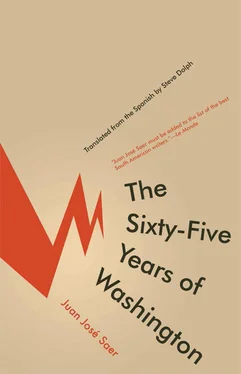Juan José Saer - The Sixty-Five Years of Washington
Здесь есть возможность читать онлайн «Juan José Saer - The Sixty-Five Years of Washington» весь текст электронной книги совершенно бесплатно (целиком полную версию без сокращений). В некоторых случаях можно слушать аудио, скачать через торрент в формате fb2 и присутствует краткое содержание. Год выпуска: 2010, Издательство: Open Letter, Жанр: Современная проза, на английском языке. Описание произведения, (предисловие) а так же отзывы посетителей доступны на портале библиотеки ЛибКат.
- Название:The Sixty-Five Years of Washington
- Автор:
- Издательство:Open Letter
- Жанр:
- Год:2010
- ISBN:нет данных
- Рейтинг книги:3 / 5. Голосов: 1
-
Избранное:Добавить в избранное
- Отзывы:
-
Ваша оценка:
- 60
- 1
- 2
- 3
- 4
- 5
The Sixty-Five Years of Washington: краткое содержание, описание и аннотация
Предлагаем к чтению аннотацию, описание, краткое содержание или предисловие (зависит от того, что написал сам автор книги «The Sixty-Five Years of Washington»). Если вы не нашли необходимую информацию о книге — напишите в комментариях, мы постараемся отыскать её.
The Sixty-Five Years of Washington — читать онлайн бесплатно полную книгу (весь текст) целиком
Ниже представлен текст книги, разбитый по страницам. Система сохранения места последней прочитанной страницы, позволяет с удобством читать онлайн бесплатно книгу «The Sixty-Five Years of Washington», без необходимости каждый раз заново искать на чём Вы остановились. Поставьте закладку, и сможете в любой момент перейти на страницу, на которой закончили чтение.
Интервал:
Закладка:
Every fifteen meters, a tipa tree rises at the edge of the sidewalk, and its branches almost touch those that, at the same height, grow from a tree on the opposite sidewalk. In the spaces between the trim branches, patches of blue sky can be made out, and on the street and the opposite sidewalk the bright stretches outnumber those in shadow. Puerile, in every color, at a constant speed, the cars run in both directions: those coming toward Leto on his side, and those that, likewise, follow his direction, alongside the other sidewalk. Flashes and shadows from leaves and branches alternate fleetingly over the chrome of the bodywork, over the painted molding and the glass, as they travel down the tree-lined street. Other pedestrians — not many, because of the distance from the city center as well as the relatively early hour — walk, alone or in groups, lost in thought or conversation, along the sidewalks. Another thirty meters and Leto will reach the corner.
It is, as we know, the morning: though it doesn’t make sense to say so, since it is always the same time — once again the sun, since the earth revolves, apparently, has given the illusion of rising, from the direction they call the east, in the blue expanse we call sky, and, little by little, after the dawn, after daybreak, it has reached a spot high enough, halfway in its ascent let’s say, so that, through the intensity of what we call light, we refer, to the state that results, as the morning — a spring morning when, again, though, as we were saying, it is always the same time, the temperature has been rising, the clouds have been dissipating, and the trees which, for some reason, had been losing their leaves bit by bit, have begun to bloom again, to blossom once more, although, as we were saying, it is always the same, the only Time and, so to speak, from equinox to solstice, it’s the same, no? As I was saying, we call it a because it seems like there have been many, because of the changes, which we name and presume to perceive — a dazzling spring morning, forming for three or four days, since the end of the last rains in September or October that wiped clean the final traces of winter from a sky that grew warmer and clearer each day. Leto feels neither good nor bad: he walks oblivious, in the morning, in the center of a material horizon that sends him, in constant waves, sounds, textures, flashes, odors. He is submerged in this horizon and is, at the same time, its center; if, suddenly, he disappeared, the center would change location.
For this reason, in order to prove that he suffered so much, some three months before she had found a lump in her right breast, like the seed from a paradise tree , and had begun to worry. Charo, the elder cousin who, lacking a boyfriend or husband, had acquired, at forty-five, an approximate understanding of nearly every illness in order to fill the cavity of any other curiosity or sed non satiata , had insisted that she make an appointment with a specialist — an illuminary , his aunt Charo had trilled, dithyrambic, though she was not, in reality, anything more than his second cousin. Leto thinks: It wasn’t wrong to have told Charo either. It’s as if you were to suggest to a madam that you had some spare cash you’d like to spend on an escort. Because of his international conferences, the dinner-conferences at the Rotary, and the rows of the cancerous and its candidates leafing through old magazines in the waiting room of his office, the specialist had only recently seen her, a month after her discovery, and after looking her over, examining her, carefully and skillfully, had told her, with distracted lightheartedness, that, in his modest opinion, there was no reason to worry, and that a more meticulous exam or a biopsy were not justified . The lump, the size of a seed from a paradise tree , according to Isabel, or of an acorn , according to Charo, who, for some obscure and undetermined reason, had also performed an examination, did not reveal itself to the fingers of the specialist, which, though they searched and searched again did not find a single notable hardness in Isabel’s now, on the contrary, somewhat shapeless breasts — not in the right or the left. The specialist sat down at his desk and had begun to fill out a form, and, while she dressed, standing near the bed, Isabel had begun an inquiry full of allusions, to which the specialist would respond with ambiguous monosyllables, whose meaning, like those of the blotches in a psychological test, depended on what pre-existed in the observer. According to Isabel, upon seeing her come in, the specialist had given her significant looks, as she had presented herself with her married name, and her husband’s case, so recent, and so sudden too, as often happens with young people, had probably not been forgotten. Because when she came in they had made her fill out a form where she wrote that she was born in Rosario, and since he would surely have come from Rosario for a consultation, the specialist could not have missed the connection. Of course, because of professional confidentiality— yes, they have that categorical imperative , Charo had confirmed — the specialist could not make it plainly known that he had been to see him during his frequent trips to the city and that, after having examined him, had found that incurable illness, but his responses, deliberately imprecise, were nevertheless significant enough to dismiss any of her leftover doubts. But she’s not too sure she’ll be believed because she insists so much , thinks Leto. That same night she had called Rosario to confirm it with Lopecito who, protective and attentive, had interrupted her revelations with a firm, Don’t waste your money. I’ll call you back , so they hung up and a minute later, when the phone rang from Rosario, she picked up, impatient and satisfied, conveying, in complete detail, the confirmation of her suspicions which, in a discreet but unmistakable way, the specialist had given her. Lopecito, who from the age of twenty-five had begun, in a tacit way, to court her, who had seen her marry his best friend, and who had even been a witness in the civil ceremony, who had seen her have two miscarriages in the second or third month before finally getting pregnant with Leto and bringing him into the light of the world, who had been the impassive confidant for the matrimonial lurch of both man and wife and who, the year before, had finally seen her widowed, being left in the awkward position of eternal pretender and of her husband’s childhood friend whose world was coming up roses — Lopecito, no? — who between his distribution of two or three television brands and his duties as a member of the Rosario Central Festival planning committee, had found enough time to make their leaving Rosario possible without agreeing with the decision, the move, the costs, he had recommended her as a saleswoman in an appliance store and Leto as bookkeeper for two businesses in the city center, he had administered, through his relationships downtown , as he liked to say, her late husband’s pension, and would come to visit them from Rosario every fifteen days, sleeping in a hotel so it would be clear to everyone that they wouldn’t soil the memory of a loved one, likewise feeling enough devotion to Isabel to accept, despite representing in the eyes of the world the voice of moderation, each of her points of view, her discrete extravagance, her constant struggle to deny the obvious, her repeated interpretations among which the theory of an incurable illness isn’t even , Leto thinks as he reaches the corner, the least bit preposterous.
The corner, where the two lines of cars driving on San Martín in both directions slow down, is particular in this way: because the cross street runs east to west, the shade of the row of houses disappears, and as there is nothing to intercept the rays of the sun shining above the street, the street and sidewalk are now filled with light, so as to make Leto’s shadow, which has appeared in a sudden way, only slightly shorter than his body, project itself onto the gray pavement and fall to the west. When Leto is about to step off the gray sidewalk into the cobbled street, his shadow is broken by the cable guardrail and continues to be projected onto the even cobblestones of the street. The shadow moves forward, slightly oblique to the body, breaks again at the cable guardrail on the opposite sidewalk and when Leto’s shoes touch the opposite pavement, continues to slide across the sidewalk until Leto enters the shade of the row of houses and his own shadow disappears. The square is deserted — not abandoned, but deserted — empty, without the presence of people (apart from Leto) who, like him, are also the center of a horizon that, as they move, moves with them. After walking a few meters under the trees, he sees appear, suddenly, on the next corner, a boy on a bicycle who has turned the corner of the cross street, advancing toward him on the sidewalk. It proceeds with that kind of undulation bicycles have when they are not moving very quickly, and whose equilibrium, which the cyclist recovers with every pedal stroke, is not the principal consequence but the transient and fragile phase of a more ample and more complete movement. The cyclist, no more than nine or ten years old, his legs barely able to reach the pedals when they are at the lowest point of their circular path, moves, in spite of his slowness, much more quickly than Leto, whose pace, neither slow nor fast, has not varied since he crossed the boulevard and began walking down San Martín. As he approaches — his velocity, while constant, is increased by Leto’s opposite movement — Leto can hear, each time more clearly, the complex sounds issuing from the bicycle, metallic squeaking, the hum of rubber against the pavement, the stretching and creaking of leather, pedals, spokes, cables in an invariable sequence that repeats periodically because of the regularity of the movement. The bicycle passes between Leto and the row of houses, and the series of sounds, which had reached, arriving next to Leto, its maximum intensity, begins to diminish behind him until finally it is no longer heard. Leto does not even turn and, strictly speaking — as they say, no? — they have barely seen each other, moving in opposite directions and each taking his own horizon with him.
Читать дальшеИнтервал:
Закладка:
Похожие книги на «The Sixty-Five Years of Washington»
Представляем Вашему вниманию похожие книги на «The Sixty-Five Years of Washington» списком для выбора. Мы отобрали схожую по названию и смыслу литературу в надежде предоставить читателям больше вариантов отыскать новые, интересные, ещё непрочитанные произведения.
Обсуждение, отзывы о книге «The Sixty-Five Years of Washington» и просто собственные мнения читателей. Оставьте ваши комментарии, напишите, что Вы думаете о произведении, его смысле или главных героях. Укажите что конкретно понравилось, а что нет, и почему Вы так считаете.












